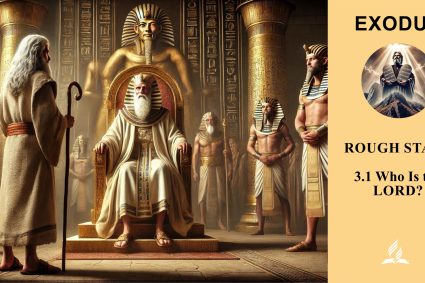


3.6 Summary
Light in the Eternal Struggle
The lesson “Light shines in darkness” highlights the importance of spiritual vigilance and understanding divine truth in a world characterized by deception and seduction.
-
Compromises, Satan’s cunning strategy: The significance of distinguishing between Jesus’ truth and Satan’s lies is emphasized. Jesus, considered the embodiment of truth, always used the Holy Scripture as a response to Satan’s deceptions. Understanding the Bible and not being influenced by false interpretations is crucial.
-
Ravenous wolves: Paul warns of both internal and external threats to the church, emphasizing the need for vigilance. He speaks of “ravenous wolves” and urges purity in doctrine and protection against deviations and seductions.
-
Preserved by God’s Word: The Holy Scripture serves as an unshakable foundation and shield against the deceptions of evil. Both Jesus and Paul underscore the importance of the Bible as divine revelation and an anchor in a constantly changing world.
-
Human understanding without the Bible: Without divine guidance through the Holy Spirit and the wisdom of the Bible, human understanding can easily go astray. It is stressed that the Bible serves as a reliable guide and ultimate source of truth and morality.
-
Battle for the mind: Paul’s description of the spiritual battle in 2 Corinthians 4:3–6 illustrates Satan’s strategy to cloud people’s perception. The Gospel, embodied by Jesus Christ, is portrayed as the key to enlightenment and overcoming spiritual darkness.
Overall, this lesson emphasizes the transformative power of the Gospel and the Holy Scripture as means of understanding, orientation, and protection against the seductions and deceptions of evil. It reminds us that the Bible and the Gospel serve as light and compass in a confusing world, and our choice of which path to follow is crucial for our faith and life.

The connection between Lesson 3 and our daily life as well as faith is profound and has direct implications for our daily decisions, challenges, and beliefs. Here are some points that illustrate this connection:
-
Spiritual struggle: As emphasized in 2 Corinthians 4:3–6, we are engaged in a spiritual battle against the darkness of doubt, seduction, and distraction. In our daily lives, we often face situations that challenge our faith and can distract us from the truth of the Gospel. It is important to be vigilant and protect ourselves from distractions and deceptions that can lead us away from the truth.
-
Light and orientation: Jesus is described in John 1 as the light and life of the world. In a world often characterized by uncertainty, darkness, and confusion, the Gospel offers us light, hope, and orientation. In daily life, this light can guide us, offer us hope in difficult times, and remind us that there is a higher truth and hope that transcends temporal challenges and darkness.
-
Practical implementation of the Gospel: The Gospel is not just a theoretical doctrine but has practical implications for our daily lives. It offers us guidelines and principles to live by. In our daily lives, we can apply these principles by being humble, open to the knowledge and truth of the Gospel, seeking fellowship with other believers, and studying and implementing the Word of God in our lives.
-
Community and support: Fellowship with other believers can strengthen and support us when faced with doubts, challenges, and temptations. In our daily lives, it is important to have a community of fellow believers around us who can encourage, challenge, and support us.
-
Choice between light and darkness: In the struggle between light and darkness lies our choice of which path to follow. Every day, we make decisions that reflect our faith and beliefs. It is important to be vigilant and make conscious decisions that align with our faith and our relationship with God.
In conclusion, Lesson 3 teaches us the importance of being vigilant, seeking and living the light of the Gospel in our daily lives, and how we can be strengthened through community, humility, and practical implementation of the Gospel in our daily lives. It reminds us that our faith should be rooted not only on specific days or in special situations but should be rooted in every aspect of our lives.

Vigilance in faith and testing of truth are essential to overcome the influence of deceptions and preserve the unadulterated word of God.

1.Look at the quote in the Tuesday section and then consider: To what extent does Satan use similar methods today to subtly undermine the authority of Holy Scripture?
Satan uses similar methods today to subtly undermine the authority of Holy Scripture:
-
Relativism and Modernism: One of Satan’s main strategies is to portray the Holy Scripture as a product of its time and to question its absolute authority. Through the influence of modern thinking and relativism, some argue that the Bible is the work of humans and not the infallible Word of God. They claim that its message and teachings are shaped by cultural, historical, and individual perspectives, questioning its absolute truth.
-
Selective Acceptance: Another trick of the devil is to accept some parts of the Bible and reject others. Some might argue that certain parts of the Bible are no longer relevant or valid for today, leading to a selective and incomplete interpretation.
-
Doubt and Skepticism: Satan promotes doubt and skepticism towards the Bible by raising questions about its credibility, authenticity, and relevance. Through critical examinations, skeptical arguments, and alternative interpretations, he tries to shake people’s trust in the Holy Scripture.
-
Modern Thinking and Criticism: With the advent of scientific discoveries, philosophical movements, and cultural changes, Satan tries to portray the Holy Scripture as outdated, obsolete, or irrelevant. He uses modern criticism and rationalism to question the miracles, prophecies, and teachings of the Bible.
To protect ourselves from Satan’s deceptions, we must:
-
Acknowledge the Bible as the infallible revelation of God: We should accept the entire Bible as the inspired Word of God and recognize its absolute authority in our lives.
-
Study and apply the Word of God: By regularly studying, meditating on, and implementing the Holy Scripture in our lives, we can protect ourselves from deceptions and recognize the truth.
-
Remain vigilant and spiritually minded: We should be vigilant against Satan’s strategies and deceptions and constantly strengthen ourselves through prayer, studying the Scripture, and fellowship with other believers.
-
Hold the Bible as our ultimate standard: In a world full of opinions, theories, and ideologies, the Holy Scripture should be our last and final standard for faith, doctrine, and life.
By following these principles and firmly grounding ourselves in the Word of God, we can protect ourselves from Satan’s deceptions and have a solid foundation in faith.

2.What are our best protections against a false interpretation of God’s Word?
Our best protections against a false interpretation of God’s Word are:
-
Prayer: Regular prayer for understanding, wisdom, and guidance through the Holy Spirit can help us understand the Scripture correctly and be protected from deceptions.
-
Study of Scripture: Thorough and continuous study of the Bible helps us understand the context, historical backgrounds, and cultural conditions in which the Scripture was written. This enables us to better grasp the original meaning and intention of the author.
-
Fellowship with other believers: Exchanging views, discussions, and study groups with other Christians can help us understand different perspectives and develop a balanced view of the Scripture.
-
Use of reliable resources: Utilizing commentaries, lexicons, theological books, and other resources authored by trustworthy and Bible-believing theologians and scholars to better understand difficult passages or concepts.
-
Holistic interpretation: Considering the Bible as a whole and ensuring our interpretations align with the overall context and central teachings of the Scripture, rather than taking isolated verses or passages out of context.
-
Humility: Adopting a humble attitude and being willing to reconsider and correct our beliefs and interpretations when encountering new insights or being corrected by others.
-
Spiritual maturity: Striving for spiritual maturity and growth in faith through continuous education, fellowship, and practical application of biblical principles in daily life.
-
Caution against extreme views: Being skeptical of extreme or radical interpretations that contradict the fundamental teachings of Christian orthodoxy.
-
Review through church history: Using the interpretations and insights of the church fathers and Christian tradition as a kind of “historical consistency check” to ensure our interpretations align with the doctrine and faith of the church through the centuries.
By applying these protective measures and approaching the Scripture in an honest, humble, and thorough manner, we can effectively protect ourselves from false interpretations and gain a deeper and more accurate knowledge of God’s Word.
3.Satan’s essential endeavor in the great battle between good and evil is to malign God’s character and portray Him as an authoritarian, unloving tyrant. How does the Evil One attempt to achieve this, and what is God’s response to his lies?
Satan attempts to malign and distort God’s character in various ways:
-
Distortion of the truth: Satan tries to distort God’s character and intentions through half-truths or complete lies. He might try to ignore or downplay God’s love, mercy, and grace by focusing only on aspects like God’s judgment and punishment.
-
Temptation and accusation: Satan tries to make people doubt God’s goodness and care through temptations and accusations. He might ask them whether God really wants the best for them or whether God is just and loving.
-
Creating mistrust: Satan works to sow mistrust and doubt towards God’s character by asking people whether they can really trust God, especially when going through difficulties and trials.
-
Misuse of suffering and evil: Satan can use the suffering and evil in the world to claim that a loving and omnipotent God either does not exist or cannot be truly good if such suffering exists.
God’s response to these lies and slanders consists of several aspects:
-
Revelation of His love and goodness: God reveals Himself as love (1 John 4:8) and shows through His works, especially through the redemption through Jesus Christ, His boundless love, mercy, and grace.
-
Clarification of His attributes: Through the Holy Scripture, God provides a clear picture of His character, portraying Himself as just, holy, merciful, gracious, and faithful. He corrects false notions and shows that His will and intentions are always for the good of His creatures.
-
Redemption and reconciliation through Jesus Christ: Through the sacrifice and resurrection of Jesus Christ, God offers people a way to reconciliation and redemption, demonstrating His infinite love, grace, and desire to have a relationship with people.
-
Revelation through nature and conscience: God also reveals Himself through His creation and human conscience. Both speak of a Creator who is wise, powerful, and good.
-
Holy Spirit as a guide and comforter: The Holy Spirit works in the hearts of people to lead them to the truth, open their eyes, and help them recognize and understand God’s true character.
In summary, despite Satan’s efforts to tarnish God’s character, God continually responds through His deeds, His Word, and His love, revealing His true nature and intentions.

4.The Apostle Peter asserts that “no prophecy of Scripture comes from someone’s own interpretation” (2 Peter 1:20). How can we be sure that we do not twist the meaning of Holy Scripture to achieve our own goals? Why can this happen more easily than we think, and why must we therefore guard against this practice?
The correct interpretation of Holy Scripture is crucial, as wrong interpretations can lead to confusion, misunderstandings, and even false teachings. Here are some steps and considerations to ensure that we do not twist the meaning of Scripture to achieve our own goals:
-
Prayer for wisdom: Before studying or interpreting the Scripture, we should pray for God’s wisdom and guidance. The Holy Spirit, residing in us, can help us recognize the truth and protect us from errors.
-
Holistic view: It is important to consider the Scripture in context. This means not only looking at an isolated verse but seeing it in the context of the entire chapter, book, and the whole Bible.
-
Study of Scripture: Thorough study of the Scripture with the help of commentaries, lexicons, and other theological resources can help gain a deeper understanding of the historical, cultural, and linguistic context of a Bible verse.
-
Humility: It is important to maintain a humble attitude and acknowledge that we do not always have all the answers. We should be willing to reconsider and correct our views if we find they do not align with Scripture.
-
Community and consultation: It can be helpful to study the Scripture in community with other believers and hear their perspectives and insights. Often, others can provide a fresh perspective or a new view that helps us better understand the Scripture.
-
Respect for the original text: If possible, consulting the original text (Hebrew, Aramaic, Greek) or at least comparing different translations can help ensure we grasp the exact meaning of a word or verse.
Why can twisting Scripture happen more easily than we think?
-
Biases and prejudices: Our personal beliefs, experiences, and prejudices can influence our interpretation and tempt us to twist the Scripture to support our own views and goals.
-
Cultural and historical distance: We live in a different time and culture than the biblical authors, and it can be challenging to understand the Scripture in the correct historical and cultural context.
-
Human tendency for self-justification: People often have a tendency to interpret the Scripture in a way that justifies their own actions and decisions, even if they do not align with God’s Word.
For these reasons, it is crucial that we guard against twisting Scripture and always strive for an authentic, truthful understanding of Scripture.
(Visited 16 times, 1 visits today)




















